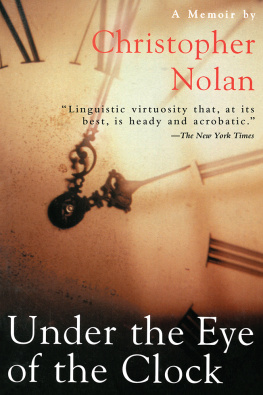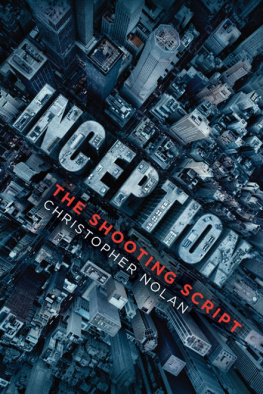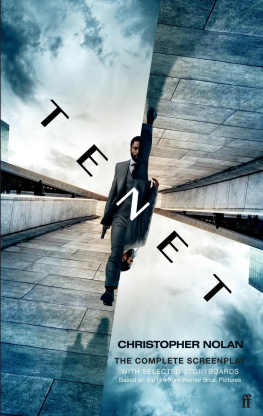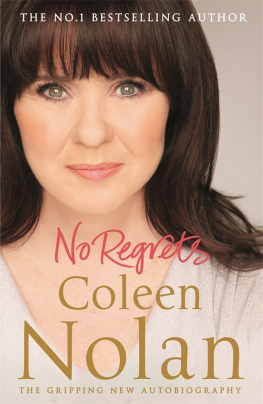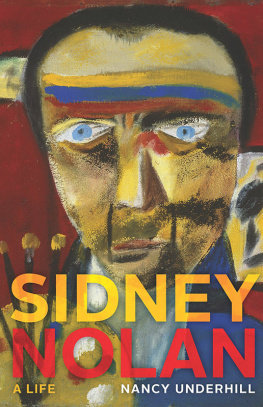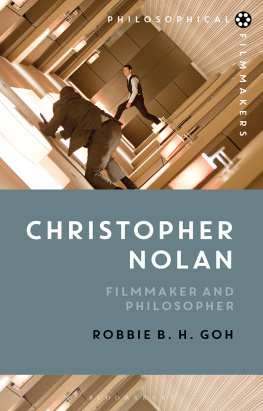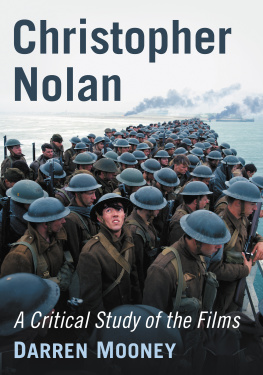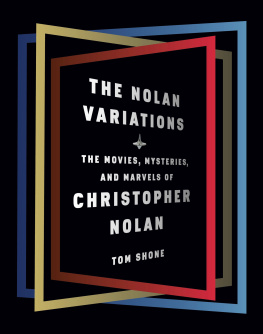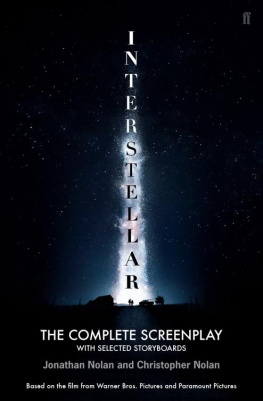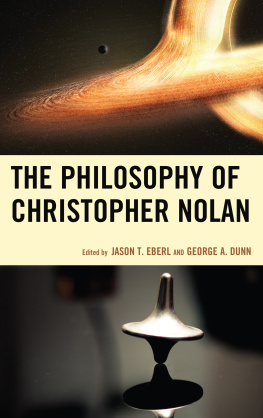Under the Eye
of the Clock
A LSO BY C HRISTOPHER N OLAN
Dam-Burst of Dreams
The Banyan Tree
Under the Eye
of the Clock
A MEMOIR BY
Christopher
Nolan
P REFACE B Y
John Carey

Arcade Publishing New York
Copyright 1987, 2013 by Christopher Nolan
All rights reserved. No part of this book may be reproduced in any manner without the express written consent of the publisher, except in the case of brief excerpts in critical reviews or articles. All inquiries should be addressed to Arcade Publishing, 307 West 36th Street, 11th Floor, New York, NY 10018.
Arcade Publishing books may be purchased in bulk at special discounts for sales promotion, corporate gifts, fund-raising, or educational purposes. Special editions can also be created to specifications. For details, contact the Special Sales Department, Arcade Publishing, 307 West 36th Street, 11th Floor, New York, NY 10018 or arcade@skyhorsepublishing.com.
Arcade Publishing is a registered trademark of Skyhorse Publishing, Inc., a Delaware corporation.
Visit our website at www.arcadepub.com.
10 9 8 7 6 5 4 3 2 1
Library of Congress Cataloging-in-Publication Data is available on file.
ISBN: 978-1-61145-814-5
Printed in the United States of America
A CHILDS REMEMBERING.
Chimes, ago in Gortnamona,
Nimbly gong bold ding dong,
Pummelled in my brain, bespoked,
They burrow now and still.
Playing then and playing now
Mobile-notioned ladders,
I climb up and slither back
My very chastened chiming.
Baby then but fifteen months,
I chance home often there,
Never physically to return,
My new home, a farm elsewhere.
But back I go and dwell awhile Cosy kitchen in Rathgowan,
The wallpaper basket-woven,
The presses painted green.
Bubbling memory vests the layout,
Childlike as in a dream,
My momentary mental visit
Blinks awake on a false ding dong.
CONTENTS
PREFACE
A new book by Christy Nolan does not need a preface by me or anyone, but he has asked me to write one and I am glad to. His first book, Dam-Burst of Dreams, was a jubilant, lawless debut. He plummeted into language like an avalanche, as if it were his one escape route from death - which, of course, it was. He had been locked for years in the coffin of his body, unable to utter. When he found words he played rapturously with them, making them riot and lark about, echoing, alliterating and falling over one another. The bulging vocabulary kept sending you to the dictionary (lassistral? lemberyinth?), only to find, more often than not, that you were far beyond charted usage, floundering fathomless in Nolans neological sea.
It was, of course, a tragic book too. But the tragedy was challenged (as in this book) by the resourcefulness of the very language which expressed it. Nolan constantly subverted and remade idiom. He wrote, for instance, of tears that peter down my face, reminding us of the idiom peter out, which we use of paths that go nowhere or speech that dies away, but pushing the idiom askew, so that we see these new tears - slow, silent, hopeless as we have never quite seen tears before.
The energy, newness and abundance of Dam-Burst can be found in this book too. Josephs nightly dreams, for example, become ethereal and lexical forays - mesmerized woldwaddling in inkblue heavens busy mobility of secrets. The linguistic puzzles persist as well. Certain words fees, fresco have, you come to realize, special meanings for Nolan, and understanding this unties some knots. Frescoed delights at the Dn an ir dance, and he frescoed farsighted fame (in the Co. Clare shore scene) both suggest something bright, larger than life, and (like a fresco) seen but not shared in. The meaning is not too hard to catch.
But how about (to choose one example from scores) Josephs realization that he can never marry: he had long ago snapped shut his challenging, fees-fashioned future and humanhinded his woldway as a celibate pilgrim through life? Fees-fashioned, given Nolans use of fees to mean sacrifice, is manageable. But humanhinded? It is deceptively like, and bitterly unlike, humankinded: but what does it mean? Is the hind element hind as in behindhand, or as in hindrance, or as in hind (simple country fellow)? Or all three? This sense of language expanding beyond its own boundaries, and beyond our reach, is a typical Nolan effect, and one thing that prompts the frequently made comparison with Joyce.
Despite these similarities with the previous book, Under the Eye of the Clock is different, and a development. Plain statement and straightforward reportage now intermix with the bravura passages, allowing Nolan new kinds of tonal contrast, a new capacity for extended narrative, and a new realism. The observed world takes on unaccustomed clarity by courtesy of his verbal skills. On a beach, he watches the soft greased waves creep towards him; horses in the market square release their musty urine and: in artistic fashion it scribbled away breaking here and there into little rivulets all chasing after their pitiful bend. Compare this with the tears that petered down his face in Dam-Burst and you can see that the vision has now been turned outward. The imaginative response is as acute, but a self-forgetting empathy now embraces the observed world - even its horse urine. The showpiece of this kind of creativity is the description of Josephs mother gutting a turkey - a passage which should find its way into future anthologies of English prose. Like much of Nolans writing, it combines a childs weird fanciful sympathy (A huge gllomp sighed from the depths within) with the mind and vocabulary of an adult.
This double act is something Nolan clearly recognizes in himself, and identifies as a fruit of his disability. It was because he realized the terrible truth about his body that, he relates, when only three years old, he cried the tears of a sad man. Dam-Burst already showed a brilliant ironic acuteness in describing other peoples reaction to his crippledom, and the same unsentimental intelligence appeared in the poems he wrote about his parents. Mature and considerate, they seemed to be written by a grownup looking back, not by a child. He spoke of his paralysis as if it were some piece of adult news which he had, regretfully, to break to innocent bystanders: Woefully once I totally opened their eyes. Similarly, in the poem Dad and Mam, the sophisticated diction used throughout contrasts calculatedly with the Dad and Mam in the title, so that those juvenile forms of address seem to be recalled from some much earlier stage of life.
In Under the Eye of the Clock this strangely poised detachment from himself and his condition a detachment which is still hopelessly trapped in the disabilities it frees itself from - continues to intrigue the reader and, it seems, the writer too. He dreams he is a window-cleaner, balanced on a rattly silver ladder, cleaning big circles with his plaid cloth - whistling, active, happy - when suddenly, through the glass, he catches sight of a boy asleep in a bed - himself. The question this dream prompts, how can Boyhood be in two places at the same time? - is what the whole book, with its extraordinary alliance of distance and closeness, answers.
Another area where this book shows both continuity and advance is the religious. The writers Catholicism was already firm and clear in Dam-Burst. But the reader felt uneasy about its very firmness and clarity. Was not faith too pat a consolation, in the circumstances? How could it endure such a pitiless doom? How can you forgive a God who has put you into a spastics body? Maybe these questions occur more readily to readers who are not Catholics, but at all events the poems did not answer them, nor did they do more than hint at the furious outcries and reproaches with which this ruined boy arraigned his Maker.

